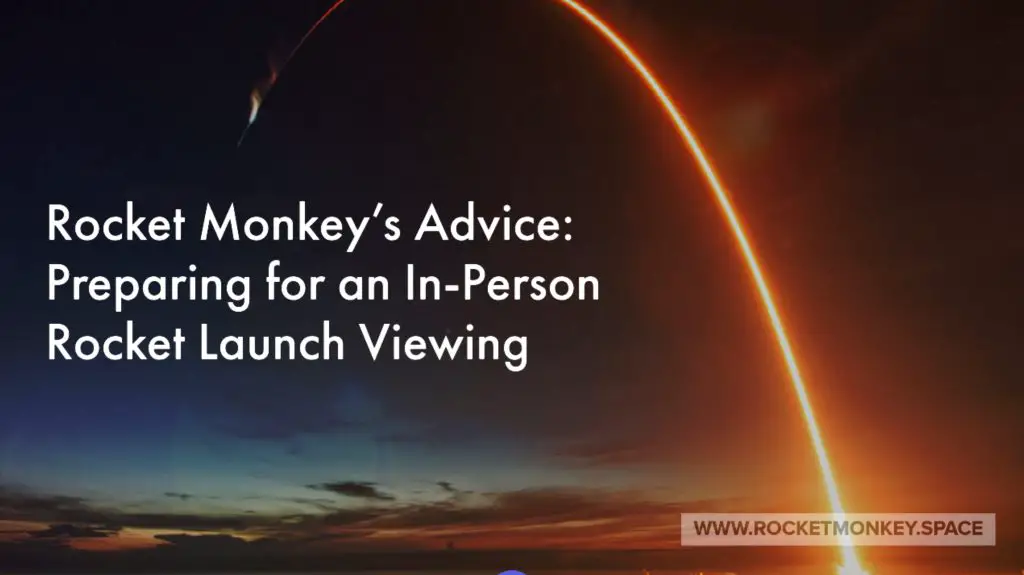
Tips For Watching a Rocket Launch In-Person
Many of us have seen rocket launches on TV or through Internet streaming, but there’s nothing quite like experiencing a rocket launch in-person. If you are planning to check this experience off of your “bucket list”, there are some things that you should know to make the planning process easier for you.
Tip #1: Know WHERE to Go watch the Rocket Launch
Finding your prime viewing spot may seem like a daunting task at first. There are many things to consider as you choose your in-person viewing location.
Consider things like:
- Which launch pad the rocket is lifting off from. You can find where the rocket is lifting off from on the Space Launch Schedule website.
- The live video feed is delayed a couple minutes.
- The distance of the viewing point from the launch site.
- Surrounding elements that impact visibility (i.e. trees, buildings, other space enthusiasts, vehicles, road closures, construction, etc.)
- Ease of entry and exit from the viewing site (is it accessible for myself and any other in-person viewers I bring with me?)
- Visit the following links to assist you with viewing location selection:
Tip #2: Know WHEN to Go watch the Rocket Launch
Timing is critical when traveling to your desired rocket launch viewing location. You will want to arrive at your selected viewing site with plenty of time to spare.
As you create your launch day itinerary, be sure to keep the following tips in mind:
- Be aware that some launches have a launch window. (This is a prescribed “window” of time when the rocket launch can occur and the rocket launch can happen anytime within the launch window).
- Plan to arrive at your desired viewing location about two (2) hours ahead of the launch window.
- Calculate travel time with a buffer in mind as you can expect very heavy traffic upon arrival and departure from the launch viewing site.
- Be prepared for delays. Many rocket launches are delayed and sometimes “scrubbed” or postponed until a later date.
- If traveling to the launch site from out-of-state, be sure to book your flights at LEAST 30 days out for the best deals and plan to make a “staycation” out of this experience. This will account for any delays or scrubbed launches.
Tip #3: Know WHAT to Bring to the Rocket Launch
So you have identified your ideal viewing spot, you’ve planned your timeline and mapped out your travel to the location, what else should you do? You will need to pack up some essential gear to make your rocket launch viewing a successful mission. Your viewing “essentials” may vary based on the number of launch enthusiasts that will be joining you, so you will need to consider individual needs and quantities.
However, some basic essentials that you should consider bringing along include:
- Full tank of gas in your vehicle
- Bottled Water/Beverages
- Snacks
- Any medications needed
- Insect Repellent
- Sunscreen
- Sunshade
- Sunglasses
- Umbrella
- Rain jacket or Poncho
- Binoculars
- Camera and Tripod
- Mobile Phone with Data Access
- Charger for mobile phone
- Entertainment etc. Frisbee or football
Tip #4: Know HOW to Maximize Your Rocket Launch Viewing Experience
So, the day of viewing has arrived, you’ve successfully traveled to your prime viewing location with plenty of time to spare and you’ve brought all of your essential items to keep you in rocket viewing shape. Now what?
Maximize your in-person viewing experience by doing the following:
- View the Space Launch Schedule launch details page to watch the live video feed of the launch on your mobile device for updates on the launch status.
- Be sure to actually watch the launch (especially if it is your first in-person launch). Many of us get distracted trying to get that “perfect photo or video” that we miss all of the perks of viewing the launch in real-time.
- Bust out the binoculars and put the phone away. There are a plethora of high-resolution images and videos of the launch available online post-launch, so be sure to enjoy the in-person experience through your own eyes.
- Feel the viewing experience by waiting for the rumble of the rocket engines and watch and hear the sonic boom of the booster landing if it is scheduled to return to Cape Canaveral or Vandenberg AFB.